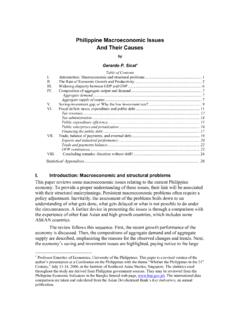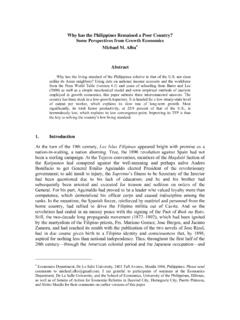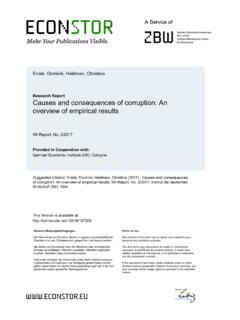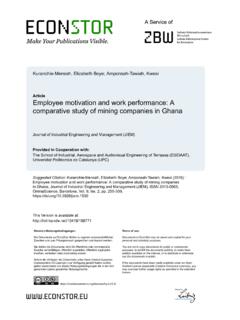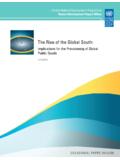Transcription of Globalisation Theories and Their Effect on Education
1 Globalisation Theories and Their Effect on EducationNikoloz PARJANADZEA bstractGlobalisation is a relatively new concept in social sciences, especially in educational research and there is no agreement on its essence. The article presents three stances within Globalisation theory the hyperglobalist , the sceptical and the transformational, which reflect disputes concerning new global trends. The discussion highlights social, economic and political aspects globalization theory deals with. The article focuses on the effects of Globalisation over Education and the demands it has introduced to the field. Historically Education played vital role in the formation of nation states and national identity. However, there is strong support to the assumption that Globalisation poses a threat to small nations and ensures the dominance of Anglo-Saxon culture over the others.
2 The article argues that Globalisation , state and Education are closely linked notions and if any of the components lacks, often it is difficult to have a thorough understanding of each of them. And in spite of some stances indicating to the demise of the nation states and the national Education systems, the argument is developed that in the global era the role and meaning of each of them have intensified. Though the process of Globalisation has brought along policies full of contradictions, the transformationalist stance suggests that positive and balanced approach be employed to react to global : Globalisation ; Education ; policy borrowing; decentralisation; Globalisation Theories ;Nikoloz Parjanadze is a director of TOEFL Center at International Black Sea UniversityPage | 77 IBSU Scientific Journal 2009, 2(3), 77-88 IBSUSJ 2009, 2(3)IntroductionGlobalisation is a relatively new concept in social sciences (Delanty, 2000), especially in educational research (Green, 1999), and though it permeates all fields of socio-economic, political and cultural life, there is no agreement about the nature of the phenomenon, and the definitions may vary from person to person depending on Their worldview.
3 This article will present three major stances in Globalisation theory: the hyperglobalist, the skeptical and the transformational. These approaches to global tendencies will form the framework for the discussion about Globalisation and its effects on Education . In accordance with the transformationalist view it can be suggested that we now all live in one world (Giddens, 1999, ) and this interconnectedness can positively, as well as negatively affect political, cultural and socio-economic spheres. The Advent of GlobalisationGlobalisation tendencies have been determined by many factors. Its theory is underpinned by the dichotomy of time and space and how the change of these dimensions affect modern world (Green, 1997).
4 Money, international communication and trade, intercultural relations, environmental issues, and global security and democracy are socio-economic, political and cultural aspects Globalisation theory deals with (Held, 2004 (a)). Economic factors are often listed first and as Green (1999, ) argues economic Globalisation theory is on the safest ground. Trade and exchange of goods and services between the nations promote 'unified global economy' (Waks, 2006, ). However, it is a mistake to assume that only economic issues, though extremely important, determine the nature of Globalisation (Giddens, 1999). Technological development has made transnational connection easily accessible. The transmission of the first message by electric telegraph in the nineteenth century by Samuel Morse gave start to a new world history (Giddens, 1999).
5 Open and easy communication between nations has created grounds for 'cultural homogenization' developing 'a single global society' (Waks, 2006, ). This interconnectedness has caused re-norming and re-shaping political agendas of states across the world as they have to respond to 'global politics' (Held, 2004 (b), ). Political events do not carry local character any more. Thus, whether Nikoloz PARJANADZEPage | 78 IBSUSJ 2009, 2(3) Globalisation is a 'cultural paradox' (Sahlberg, 2006, ) or a natural phenomenon brought along by modern times, it is underpinned by political, economic, technological and socio-cultural factors (Cheng, 2004; Green, 1997; Green, 1999; Held, 2004 (a); Tikly, 2001; Waks, 2006). Globalisation , the State and EducationThe concepts of Globalisation , nation state and Education are closely intertwined.
6 As has been mentioned Globalisation has brought along total rethinking of political and social structures, economic relations and cultural values. This has been taking place within a context of state transformation. The process needs to be observed carefully in order to promote the correct understanding of Globalisation and its effects over the nation states (Waks, 2006). National Education systems played an important role in the formation of modern nation states of Europe (Green, 1997). The history of statehood begins with absolute state when power was possessed by 'elites' at the highest levels of the social structure. The absolute state was replaced by the liberal state as commoners involved in commerce acquired greater social power (Waks, 2006, ).
7 That is when absolutism yielded its dominance which created grounds for the formation of a new type of a nation state legitimated by the people or the nation (Green, 1997, ). However, it was in the era of European absolutism when national Education systems first came to existence (ibid). The next stage in the state transformation was a shift to liberal-democratic state when market came into play. And finally, the twentieth century witnessed the struggle between welfare and neo-liberal states . The former proved to be expensive and could not provide answers to global challenges. Through neo-liberal policies the states have tried to respond to problems posed by Globalisation . In a world based upon active communication, hard power power that comes only from the top-down loses its edge (Giddens, 1999, ).
8 Re-thinking values and re-shaping national consciousness, wider democratization and devolution of power and authority have been recognized as a salvation. However, as Giddens (ibid) states even democracy needs more democratization in modern what has been said about state transformation depicts the history of European nation states , the historical role of Education systems Page | 79 Globalisation Theories and Their Effect on EducationIBSUSJ 2009, 2(3)of other nations is nonetheless important. However, it is essential to look at the development of European states as later the article will present one of the arguments that Globalisation is nothing but the dominance of European culture. Besides, under the conditions of global interconnectedness modern states have developed more and more similar policy agendas where Education has been assigned an important role.
9 What can be said is that Globalisation brings along re-shaping and re-thinking of values, re-modernisation of traditions and attitudes. It stages tragicomedy where Education has to play the main part. If the major issue is to change the consciousness of people, then Education has heavy burden, because people often become what they are taught that they are (Papastephanou, 2005, ). Globalisation TheoriesThe perception of Globalisation largely depends on the personal stance and greatly determines how the phenomenon is defined. Waks (2003) develops the argument that commentators can be grouped according to Their position for and against Globalisation . However, the division is far more complicated as even among the proponents of Globalisation there is a variety of opinions in terms of evaluation.
10 Still three main stances can be distinguished theorising Globalisation (Held et al., 1999). The hyperglobalist approach presents the stance in the Globalisation theory which claims that the world has entered a 'truly global age' legalising the dominance of 'global capitalism' (Tikly, 2001, ). The logic of hyperglobalist stance is underpinned by 'neo-liberal agenda' (Held, 2004 (a), ) which views Globalisation 'in terms of open market' (Waks, 2003, ). The advent of market principles causes re-interpretation of political, socio-economic and cultural issues, the restructuring of the relationship between the state and an individual, and introduces new values. However, a global market and free trade poses a threat to the national economy and puts an end to the nation state 'as the primary unit of political organisation' (Green, 1997, ).
